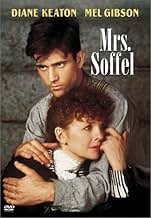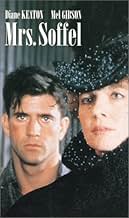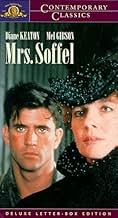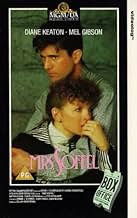IMDb RATING
6.1/10
3.7K
YOUR RATING
Diane Keaton stars as a prison warden's wife who falls in love with a death row convict (Mel Gibson.) Believing he's innocent, she helps him and his convicted brother escape.Diane Keaton stars as a prison warden's wife who falls in love with a death row convict (Mel Gibson.) Believing he's innocent, she helps him and his convicted brother escape.Diane Keaton stars as a prison warden's wife who falls in love with a death row convict (Mel Gibson.) Believing he's innocent, she helps him and his convicted brother escape.
- Awards
- 3 nominations total
Jennifer Dundas
- Margaret Soffel
- (as Jennie Dundas)
- Director
- Writer
- All cast & crew
- Production, box office & more at IMDbPro
Featured reviews
This one was a nice surprise, I hadn't seen it when it first came out, so I rented it and enjoyed it thoroughly. Diane Keaton and Mel Gibson carry the day in this true tale of a wardens wife who falls for a prisoner. Matthew Modine does a fine job as Mel Gibsons brother, and the entire cast is fine. It's beautifully shot in Pittsburgh, and there is a languid quality about it that I found alluring. Well done all around.
(1984) Mrs. Soffel
DRAMA/ SOCIAL COMMENTARY
Starring Mel Gibson as prisoner, Ed Biddle and Diane Keaton as Kate Soffel that was supposedly based on fact. That happened in 1901 centering on those two characters unusual love affair. 'The Biddle Brothers' of Ed (Mel Gibson) and his brother, Jack (Mathew Modine) are sentenced to death because of another former criminal's testimony, which this guy claims he saw the brothers shoot and kill a defenseless store clerk. Except that these claims are made by a convict who already has a criminal record. And since out of the many robberies the Biddle Brothers had done together, their had never been a recorded incident where someone had been killed as a result of those robberies, so it's more probable than not that it had never happened. Anyways, Mrs. Soffel is married to the warden of this particular prison where all she does is hand out bibles and blankets to all the inmates. At first, she doesn't believe Ed (Gibson) when he tells her that him and his brother are innocent in regarding a clerk's death, but as a result of putting one her daughters into bed, her daughter informs her as a result of saving newspaper clippings that it's more probable than impossible that 'the brothers' may be innocent. Ed then strike up an emotional attraction with Mrs. Soffel since she's not getting any from her impotent husband anymore, which her marriage seems to be lifeless. As viewers witness they sleep in separate rooms and act like husband and wife in principal only. And it was during that time, she of course does her best to prevent this death penalty to occur. Although, I liked both Mel Gibson and Diane Keaton's performances, the story structure is somewhat dull and predictable. For it was obvious the film is clearly arguing against the death penalty, solely for this reason is that the accused might be innocent. And this message was mentioned like in the first half hour before it drags and prolongs the movie by showcasing the two characters of Keaton and Gibson becoming intimate with one another, something one can get from a Harlequin novel. And that is boring which forced me to use the fast forward button on many scenes while playing.
Starring Mel Gibson as prisoner, Ed Biddle and Diane Keaton as Kate Soffel that was supposedly based on fact. That happened in 1901 centering on those two characters unusual love affair. 'The Biddle Brothers' of Ed (Mel Gibson) and his brother, Jack (Mathew Modine) are sentenced to death because of another former criminal's testimony, which this guy claims he saw the brothers shoot and kill a defenseless store clerk. Except that these claims are made by a convict who already has a criminal record. And since out of the many robberies the Biddle Brothers had done together, their had never been a recorded incident where someone had been killed as a result of those robberies, so it's more probable than not that it had never happened. Anyways, Mrs. Soffel is married to the warden of this particular prison where all she does is hand out bibles and blankets to all the inmates. At first, she doesn't believe Ed (Gibson) when he tells her that him and his brother are innocent in regarding a clerk's death, but as a result of putting one her daughters into bed, her daughter informs her as a result of saving newspaper clippings that it's more probable than impossible that 'the brothers' may be innocent. Ed then strike up an emotional attraction with Mrs. Soffel since she's not getting any from her impotent husband anymore, which her marriage seems to be lifeless. As viewers witness they sleep in separate rooms and act like husband and wife in principal only. And it was during that time, she of course does her best to prevent this death penalty to occur. Although, I liked both Mel Gibson and Diane Keaton's performances, the story structure is somewhat dull and predictable. For it was obvious the film is clearly arguing against the death penalty, solely for this reason is that the accused might be innocent. And this message was mentioned like in the first half hour before it drags and prolongs the movie by showcasing the two characters of Keaton and Gibson becoming intimate with one another, something one can get from a Harlequin novel. And that is boring which forced me to use the fast forward button on many scenes while playing.
I skimmed the other comments before writing this one in case I'd missed something, but I think my initial lukewarm reaction to the film, which I saw on Turner Classic Movies, is the one I'll stick with.
I tuned into this movie because of Mel Gibson and also because I also happen to like Matthew Modine and Edward Hermann.
One commenter said something about the director liking strong female characters, but I didn't see Mrs. Soffel as being strong. Yes, she was unfortunate to be born at a time when women were basically seen as appendages to men. Her husband was not terribly understanding. As the movie opens, she is ill. Then she seems to undergo a miraculous recovery after being bedridden for months. My interpretation of this is that she had probably been suffering from a depressive episode. Yes, Mrs. Soffel is weak. Instead of doing something positive to stir her out of her situation, she falls prey to a criminal, who, admittedly, may not have been all bad. I suppose she had formed some sort of romantic image of Ed Biddle. And perhaps he also had a romantic streak. Both characters are shown to be not at all realistic in the way they see life.
I also found the film rather slow-moving, especially at the beginning. I almost stopped watching. Overall I found, though there were some touching emotional moments, especially at the end, that the movie lacked much of a plot and the characters lacked depth. With such a weak script, I think it would be difficult for me to see much for the actors to have worked with and cannot praise their performances. I wouldn't consider the movie to have been a complete waste of my time, but I couldn't really recommend it.
I tuned into this movie because of Mel Gibson and also because I also happen to like Matthew Modine and Edward Hermann.
One commenter said something about the director liking strong female characters, but I didn't see Mrs. Soffel as being strong. Yes, she was unfortunate to be born at a time when women were basically seen as appendages to men. Her husband was not terribly understanding. As the movie opens, she is ill. Then she seems to undergo a miraculous recovery after being bedridden for months. My interpretation of this is that she had probably been suffering from a depressive episode. Yes, Mrs. Soffel is weak. Instead of doing something positive to stir her out of her situation, she falls prey to a criminal, who, admittedly, may not have been all bad. I suppose she had formed some sort of romantic image of Ed Biddle. And perhaps he also had a romantic streak. Both characters are shown to be not at all realistic in the way they see life.
I also found the film rather slow-moving, especially at the beginning. I almost stopped watching. Overall I found, though there were some touching emotional moments, especially at the end, that the movie lacked much of a plot and the characters lacked depth. With such a weak script, I think it would be difficult for me to see much for the actors to have worked with and cannot praise their performances. I wouldn't consider the movie to have been a complete waste of my time, but I couldn't really recommend it.
"Mrs. Soffel" is a wonderful movie I have seen many times, but the last viewing was so many years ago I'm watching it right now on TCM.
I'm a sucker for movies whose main characters suddenly, inexplicably make a decision which goes against everything they seem to embody, or at least that which the viewer has come to know about them. That Kate Soffel's story is a true one makes it all the more intriguing.
In early 20th-century America, the lot of a wife, even that of a well-to-do-man and mother to lovely children, was a lonely, empty, barren existence. In a wealthy household with servants, there was very little meaningful work for the mistress of the house to do every day.
Even the layers upon layers of clothes Victorian women wore served no practical purpose except to restrict movement and render their wearers merely decorative. Express your opinions and you got packed off to visit relatives in hopes that maybe the change of scenery would "do you good." There were millions of avenues for creative expression and enterprise that were simply cut off for women.
Good minds went to waste. Souls shriveled and died.
Kate Soffel (Diane Keaton) was the wife of a prison warden in Pittsburgh at the turn of the last century. She served as something of a missionary to the prisoners, giving them Bibles, holding prayer readings with them and hoping to guide them towards remorse and redemption. She never expects to fall in love with one of the inmates. But fall she does, for the charming Ed Biddle (Mel Gibson), who along with his brother Jack, (Matthew Modine) are in jail on murder charges.
Kate is suffocating; the Biddles are desperate. Prone to fits of melancholy and depression, plagued with fears that she is not a good mother and that she has failed her husband -- whom she has come to learn she really doesn't know very well -- Kate, like so many women of her era, is desperate for something to end the tedium, the frustration, the despair. She is a perfect candidate for the dangerous voyage she helps plan and sets out on with the Biddle brothers.
"Mrs. Soffel" raises many ethical and moral issues, among them the divergent path Kate takes from her religious teachings, and the Biddle brothers' guilt or innocence. It can be appreciated equally on one or more levels, but it remains a remarkably restrained depiction of emotions and passion that are anything but.
I'm a sucker for movies whose main characters suddenly, inexplicably make a decision which goes against everything they seem to embody, or at least that which the viewer has come to know about them. That Kate Soffel's story is a true one makes it all the more intriguing.
In early 20th-century America, the lot of a wife, even that of a well-to-do-man and mother to lovely children, was a lonely, empty, barren existence. In a wealthy household with servants, there was very little meaningful work for the mistress of the house to do every day.
Even the layers upon layers of clothes Victorian women wore served no practical purpose except to restrict movement and render their wearers merely decorative. Express your opinions and you got packed off to visit relatives in hopes that maybe the change of scenery would "do you good." There were millions of avenues for creative expression and enterprise that were simply cut off for women.
Good minds went to waste. Souls shriveled and died.
Kate Soffel (Diane Keaton) was the wife of a prison warden in Pittsburgh at the turn of the last century. She served as something of a missionary to the prisoners, giving them Bibles, holding prayer readings with them and hoping to guide them towards remorse and redemption. She never expects to fall in love with one of the inmates. But fall she does, for the charming Ed Biddle (Mel Gibson), who along with his brother Jack, (Matthew Modine) are in jail on murder charges.
Kate is suffocating; the Biddles are desperate. Prone to fits of melancholy and depression, plagued with fears that she is not a good mother and that she has failed her husband -- whom she has come to learn she really doesn't know very well -- Kate, like so many women of her era, is desperate for something to end the tedium, the frustration, the despair. She is a perfect candidate for the dangerous voyage she helps plan and sets out on with the Biddle brothers.
"Mrs. Soffel" raises many ethical and moral issues, among them the divergent path Kate takes from her religious teachings, and the Biddle brothers' guilt or innocence. It can be appreciated equally on one or more levels, but it remains a remarkably restrained depiction of emotions and passion that are anything but.
Mel Gibson's performance in "Mrs. Soffel" is superb in any event, but viewed in the context that it is the first time he played an American character on film, that his brother was played by American actor Matthew Modine, and that the film was based on a true story of two men from Pittsburgh, it is an even greater achievement.
Did you know
- TriviaThe jail used in the movie is the actual Allegheny County Jail that figures in the story. Designed by noted architect Henry Hobson Richardson, built between 1884-1888, it served as a jail until 1995 and is now used by the juvenile and family sections of the Common Pleas Court.
- GoofsA toy electric train shown running around a Christmas tree is of a post-1950 design, as is the track. The train is based on 19th-century locomotive and passenger car prototypes, making it more plausible. However, toy electric trains that even remotely resembled the one shown did not exist by 1901.
- Quotes
Kate Soffel: Don't you let them take me alive, Ed. Promise me. Promise me, Ed.
Ed Biddle: I won't, I promise. I won't let them take you.
- ConnectionsFeatured in The Making of 'Mrs. Soffel' (1984)
Details
Box office
- Budget
- $11,000,000 (estimated)
- Gross US & Canada
- $4,385,312
- Opening weekend US & Canada
- $86,280
- Jan 1, 1985
- Gross worldwide
- $4,385,312
- Runtime1 hour 50 minutes
- Sound mix
- Aspect ratio
- 1.85 : 1
Contribute to this page
Suggest an edit or add missing content

Top Gap
By what name was Mrs. Soffel: Révolte et passion (1984) officially released in India in English?
Answer




































